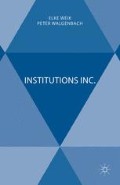Abstract
From the dawn of written records comes one of the most pervading definitions of Man, as zoon logon echon or animal rationale. Older even than the writings of Aristotle, to whom the concept is often attributed, this definition’s origins takes us into the 6th century B.C. (Grawe and Hügli, 1980). It is this idea of Man (we will not be talking Woman for another two millennia) as the only organism capable of thinking and talking that shapes European anthropology and culture. It is the core conviction that propels Rationalism, the Enlightenment and Idealism at the beginning of modernity. In the Middle Ages it moves Man into the proximity of God and the angels, both entities that are more rational and thus even more perfect. The one thing that holds Man back in comparison with them, that mars his perfection and gives him an animal character, is his body. In the trinity of soul, reason and body, the latter constitutes the ‘dark side’ and imperfection; a contrast that becomes even starker when the trinity is reduced to the duality of mind and body.
Access this chapter
Tax calculation will be finalised at checkout
Purchases are for personal use only
Preview
Unable to display preview. Download preview PDF.
References
Bourdieu, P. (1984) Distinction (Cambridge, MA: Harvard University Press).
—. (1991) ‘Sport and social class’, Rethinking Popular Culture: Contemporary Perspectives in Cultural Studies, 357–73.
Elias, N. (1994) The civilizing process: The history of manners and state formation and civilization (Trans. Edmund Jephcott. Oxford: Blackwell).
Fligstein, N. (2001) ‘Social skill and the theory of fields’, Sociological Theory, 19 (2), 105–25.
Foucault, M. (1977) Discipline and punish (New York: Pantheon).
—. (1978) The history of sexuality (New York: Pantheon).
Friedland, R. and Alford, R. (1991) ‘Bringing society back in: Symbols, practices, and institutional contradictions’ in P. DiMaggio and W. Powell (eds.) The new institutionalism in organizational analysis (Chicago: University of Chicago Press), pp. 232–63.
Grawe, C. and Hügli, A. (1980) ‘Mensch’ in J. Ritter and K. Gründer (eds.) Historisches Wörterbuch der Philosophie, Vol. 5 (Darmstadt: Wissenschaftliche Buchgesellschaft), pp. 1071–74.
Joas, H. (1996) The creativity of action (Cambridge: Polity Press).
Matten, D. and Crane, A. (2005) ‘Corporate citizenship: Toward an extended theoretical conceptualization’, Academy of Management Review, 30 (1), 166–79.
Ortmann, G. (2010) Organisation und Moral (Göttingen: Velbrück Wissenschaft).
Scott, R. (1998) Organizations: Rational, natural, and open systems (Upper Saddle River: Prentice-Hall).
Shilling, C. (1997) The body and social theory (London: Sage).
Strejcek, B. and Zhong, C.-B. (2014) ‘Morality in the body’ in L. Shapiro (ed.) The Routledge handbook of embodied cognition (London: Routledge), pp. 220–30.
Weik, E. (2012) ‘Introducing “the creativity of action” into institutionalist theory’, Management, 15 (5), 564–81.
Editor information
Editors and Affiliations
Copyright information
© 2016 Elke Weik
About this chapter
Cite this chapter
Weik, E. (2016). Introduction. In: Weik, E., Walgenbach, P. (eds) Institutions Inc.. Palgrave Macmillan, London. https://doi.org/10.1057/9781137481498_1
Download citation
DOI: https://doi.org/10.1057/9781137481498_1
Publisher Name: Palgrave Macmillan, London
Print ISBN: 978-1-349-69417-4
Online ISBN: 978-1-137-48149-8
eBook Packages: Business and ManagementBusiness and Management (R0)

